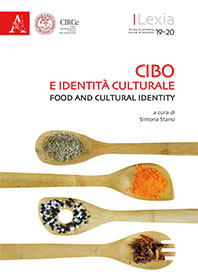Estratto da
LEXIA. RIVISTA DI SEMIOTICA
Cibo e identità culturale | Food and Cultural Identity
Le jeûne ou la faim d’autre chose : réflexions sur le sens spirituel du jeûne postmoderne
LEXIA. RIVISTA DI SEMIOTICA
Cibo e identità culturale | Food and Cultural Identity
Le jeûne ou la faim d’autre chose : réflexions sur le sens spirituel du jeûne postmoderne

ENGLISH TITLE: Thoughts on the spiritual meaning of postmodern fasting
ABSTRACT: Fasting is an increasingly popular subject of conversation, as any quick overview of mass media communications or editorial contents would attest. This article addresses fasting from a postmodern rather than a confessional point of view. This alimentary practice has its fans, who are convinced of its healthy effect on the body and the mind, but is dismissed as a kind of alternative medicine with no scientific foundation by its detractors in the world of medicine. There is a clear division between those who defend fasting passionately for its health–related aspects and those who denounce such “false beliefs” in the name of scientific reason. Since this analysis is not intended to judge the scientific nature of such approaches or to take part in the experts’ debate, it does not deal with medical or dietary considerations.We are interested in the recent rediscovery of fasting because of the irrational concerns which seem to inspire it. Roland Barthes gave a famous analysis of the myths surrounding certain foodstuffs. Yet, with fasting, we are not attaching beliefs to a particular foodstuff as a socialised object of myths, but rather to the deprival of sustenance.We start from the hypothesis that this voluntary deprival is just as capable of inspiring beliefs as food is. Although there is no food involved in the practice, fasting brings people together around common hopes and expectations, shared rituals, and as such appears as a postmodern eater’s identity. They may take their distances from religions and prescribed deprival of food, yet postmodern fasting practices also show an undeniable spiritual dimension. This study is based on contemporary forms of fasting which have been taken up and converted by marketers into commercial offers targeting the general public and dissociated from any religious dogma. It examines more closely the spiritualmeaning lying behind the discourse surrounding the products and practices which are proposed to allow people to experience fasting.We will study the multimodal construction of meaning around these forms of fasting, which can be situated semantically somewhere between religious traditions, from which they try to distance themselves, and a set of beliefs and superstitions when taken from a scientific point of view.
KEYWORDS: fast; spirituality; deprivation; food practice; religion.
ABSTRACT: Fasting is an increasingly popular subject of conversation, as any quick overview of mass media communications or editorial contents would attest. This article addresses fasting from a postmodern rather than a confessional point of view. This alimentary practice has its fans, who are convinced of its healthy effect on the body and the mind, but is dismissed as a kind of alternative medicine with no scientific foundation by its detractors in the world of medicine. There is a clear division between those who defend fasting passionately for its health–related aspects and those who denounce such “false beliefs” in the name of scientific reason. Since this analysis is not intended to judge the scientific nature of such approaches or to take part in the experts’ debate, it does not deal with medical or dietary considerations.We are interested in the recent rediscovery of fasting because of the irrational concerns which seem to inspire it. Roland Barthes gave a famous analysis of the myths surrounding certain foodstuffs. Yet, with fasting, we are not attaching beliefs to a particular foodstuff as a socialised object of myths, but rather to the deprival of sustenance.We start from the hypothesis that this voluntary deprival is just as capable of inspiring beliefs as food is. Although there is no food involved in the practice, fasting brings people together around common hopes and expectations, shared rituals, and as such appears as a postmodern eater’s identity. They may take their distances from religions and prescribed deprival of food, yet postmodern fasting practices also show an undeniable spiritual dimension. This study is based on contemporary forms of fasting which have been taken up and converted by marketers into commercial offers targeting the general public and dissociated from any religious dogma. It examines more closely the spiritualmeaning lying behind the discourse surrounding the products and practices which are proposed to allow people to experience fasting.We will study the multimodal construction of meaning around these forms of fasting, which can be situated semantically somewhere between religious traditions, from which they try to distance themselves, and a set of beliefs and superstitions when taken from a scientific point of view.
KEYWORDS: fast; spirituality; deprivation; food practice; religion.
| pagine: | 265-277 |
| DOI: | 10.4399/978885488571417 |
| data pubblicazione: | Giugno 2015 |
| editore: | Aracne |








